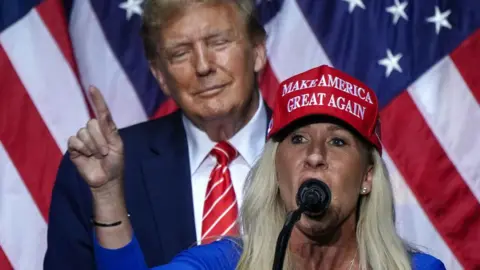Kwasi Gyamfi Adua,in Washington, And
Anthony Zurcher,North America correspondent in Washington.
Marjorie Taylor Greene announced she would resign, a surprising turn for the senior Republican.
One of Donald Trump's superstars and staunchest defenders, the Georgia congressman's relentless calls for the release of files related to late pedophile Jeffrey Epstein and recent criticism of some of his policies have led to a bitter public feud.
After being called a “traitor” by the US president, she said in a video announcing her departure: “I refuse to be a 'beaten wife', hoping that this will all go away and get better.”
Trump, who had threatened to back a Republican challenger to unseat Greene, called her resignation “great news for the country” in an interview with ABC News.
“For some reason, primarily because I refused to answer her endless barrage of phone calls, Marjorie became BAD,” he later wrote in Truth Social.
“However, I will always appreciate Marjorie and thank her for her service to our country!”
In a video message posted on social media, Greene said she would leave the US Congress on January 5, 2026.
She said she “doesn't want my sweet county to have to endure a hurtful and hateful primary against me by the President we all fought for, only to fight and win my election while the Republicans are likely to lose the midterm elections.”
She has been one of the most vocal in demanding the release of documents related to Epstein, an issue that once united Trump and his base but has since become divisive.
Trump has spent months arguing that the issue was a red herring created by his political detractors to divert attention from his administration's accomplishments.
“Defending for American women who were raped at 14, trafficked and exploited by wealthy, powerful men should not result in me being labeled a traitor and the President of the United States for whom I fought being threatened,” Greene said in her resignation letter.
Over the past few months, she has appeared on a number of high-profile news shows and criticized Trump and her fellow Republicans.
She disagreed with the president for not doing enough to lower voters' cost of living and criticized his policy of imposing tariffs on imports. But first of all, she criticized his administration for not releasing documents related to Epstein.
Trump responded last week with a series of social media posts calling Greene a “traitor” and a “fool.” He said she should be removed and promised to support a challenger to replace her in Congress.
Days after their feud reached a fever pitch, with a growing number of Republicans calling for their release, Trump reversed course and said he would support their release. This week he signed a bill that requires the US Justice Department to release documents within 30 days.
Greene was elected to Congress in 2020 amid headlines about her support and promotion of QAnon conspiracies, including claims that school shootings and the 9/11 terrorist attacks were staged. She has since apologized and attempted to distance herself from those comments.
In a video announcing her resignation, Greene ticked off a list of political accomplishments. In her resignation letter, she said Trump's comments were “hurtful.”
 AFP via Getty Images
AFP via Getty ImagesAlthough she announced her resignation from the House of Representatives, US media reports indicated that Greene had expressed interest in running for governor of Georgia or for a Senate seat.
The President publicly commented on these ambitions, writing on Truth Social during their public feud that he had previously told her that she should not run for either office due to poor public voting records.
Greene has since said she has no plans to run for either office.
Before their public spat, Trump and Greene were close allies in championing an “America First” agenda. She joined him on the campaign trail and was one of the most vocal Republicans about Trump's false claims that he won the 2020 presidential election against Joe Biden.
Her departure would further narrow the gap in the Republican-led House of Representatives, where the party has only a few more seats than Democrats. Control of the House will be determined by the 2026 midterm elections next November.







